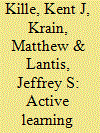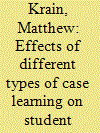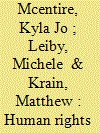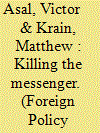|
|
|
Sort Order |
|
|
|
Items / Page
|
|
|
|
|
|
|
| Srl | Item |
| 1 |
ID:
084002


|
|
|
|
|
| Publication |
2008.
|
| Summary/Abstract |
This article reports on the results of a workshop on active teaching and learning sponsored by the Instituto de Relações Internacionais at the University of Brasilia. This 2-day, intensive workshop was designed by the authors to introduce teaching and learning strategies and to promote critical dialogue for professors and advanced students from institutions across Brazil. Details are provided on sessions that addressed the philosophy behind active teaching and learning, resources available for developing and carrying out exercises, a wide range of techniques, and the importance of debriefing and assessment. Finally, the article provides an evaluation of the workshop experience, emphasizing its potential value for training international relations instructors, both within the United States and across other international contexts, on ways to integrate active teaching and learning into their classrooms.
|
|
|
|
|
|
|
|
|
|
|
|
|
|
|
|
| 2 |
ID:
097846


|
|
|
|
|
| Publication |
2010.
|
| Summary/Abstract |
Two types of case learning-case studies and problem-based learning-have become staples in our active learning international relations classrooms. Yet few teacher-scholars have examined whether different types of case learning yield different learning outcomes. This study examines the student engagement in response to four different types of case learning: case studies with texts designed for the case method, those using written nontraditional case materials, those incorporating documentary films as case materials, and problem-based learning approaches. I survey students in two International Political Economy classes as a way of yielding an indirect assessment of how effective or useful these different approaches are, and which types of case learning engaged students most. Results suggest that the types of case learning that engaged students' senses in multiple ways-problem-based learning and case studies using films as texts-enhanced their perceptions of the exercises' effectiveness. Case studies that relied on written texts alone were not rated as highly, although were still seen as extremely valuable. These results are consistent with the findings from the cognitive psychology literature that informs the active teaching and learning approach.
|
|
|
|
|
|
|
|
|
|
|
|
|
|
|
|
| 3 |
ID:
046893


|
|
|
|
|
| Publication |
Bloomington, Indian University press, 2000.
|
| Description |
xiv, 500p.
|
| Standard Number |
025321355X
|
|
|
|
|
|
|
|
|
|
|
|
Copies: C:1/I:0,R:0,Q:0
Circulation
| Accession# | Call# | Current Location | Status | Policy | Location |
| 044121 | 327.1/O' 044121 | Main | On Shelf | General | |
|
|
|
|
| 4 |
ID:
140802


|
|
|
|
|
| Summary/Abstract |
Human Right Organizations (HROs) attempt to shape individuals’ values and mobilize them to act. Yet little systematic research has been done to evaluate the efficacy of these efforts. We identified the three most common messaging techniques: (1) informational frames; (2) personal frames; and (3) motivational frames. We tested their efficacy using an experimental research design in which participants were randomly assigned to the control group (shown no campaign materials) or one of the treatment groups shown a campaign against sleep deprivation featuring one of these framing strategies. We then surveyed participants regarding their attitudes and their willingness to act. Results demonstrate that all three framing strategies are more effective at mobilizing consensus than action. Personal narratives are the most consistently successful, increasing individuals’ sense of knowledge on the issue and their emotional reaction to the issue, leading them to reject the practice and participate in a campaign to demand its cessation.
|
|
|
|
|
|
|
|
|
|
|
|
|
|
|
|
| 5 |
ID:
065001


|
|
|
| 6 |
ID:
118162


|
|
|
|
|
| Publication |
2012.
|
| Summary/Abstract |
This study tests the effectiveness of naming and shaming by transnational advocacy networks in reducing the severity of ongoing instances of genocide or politicide. I argue that naming and shaming should force perpetrators to reduce the severity of these ongoing atrocities in order to shift the spotlight, save their reputation, reframe their identity, maintain international legitimacy and domestic viability, and ease pressure placed on them by states or IOs. I test whether naming and shaming by NGOs, the media, and IOs significantly reduces the severity of the killing. Ordered logit analyses of ongoing genocides and politicides from 1976 to 2008 reveal that naming and shaming by Amnesty International, the Northern media, and the UNCHR have significant ameliorative effects on the severity of the most extreme atrocities. Transnational advocacy networks have the potential, through naming and shaming, to lead to life-saving changes in these murderous policies.
|
|
|
|
|
|
|
|
|
|
|
|
|
|
|
|
| 7 |
ID:
158845


|
|
|
|
|
| Summary/Abstract |
What countries are most dangerous for journalists? Both conventional wisdom and extant literature on political violence, democracy, and reporter fatalities suggest that more democratic systems should make journalists safer. However, we argue that a more democratic context makes it easier for journalists to pursue stories that put them at risk and that they are thus more likely to be killed by actors trying to avoid the spotlight and exposure. Conversely, autocratic regimes provide fewer opportunities to pursue dangerous leads, thereby reducing the chance of being killed. Using novel cross-national data on the number of journalist killings between 1992 and 2008, we find that these arguments are generally supported when controlling for other factors that affect the killing of journalists, such as poor governance and political conflict.
|
|
|
|
|
|
|
|
|
|
|
|
|
|
|
|
|
|
|
|
|